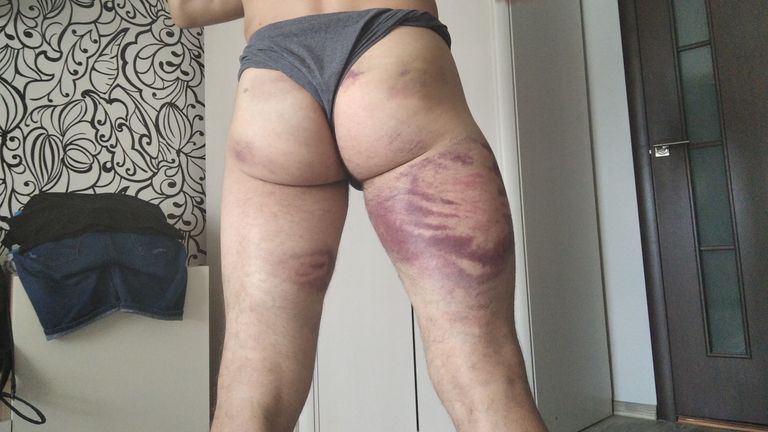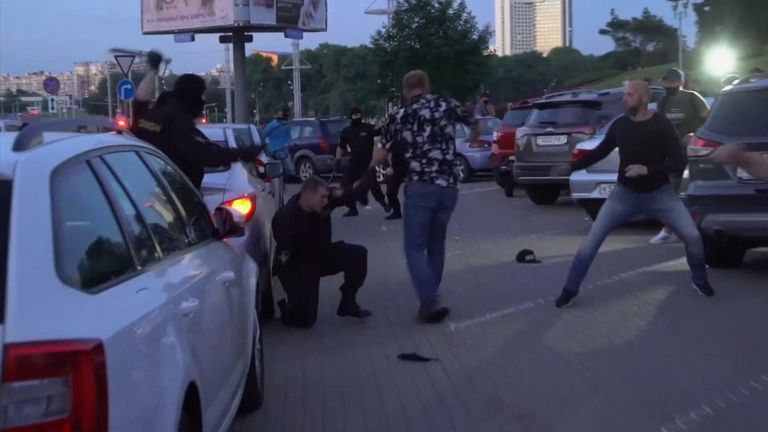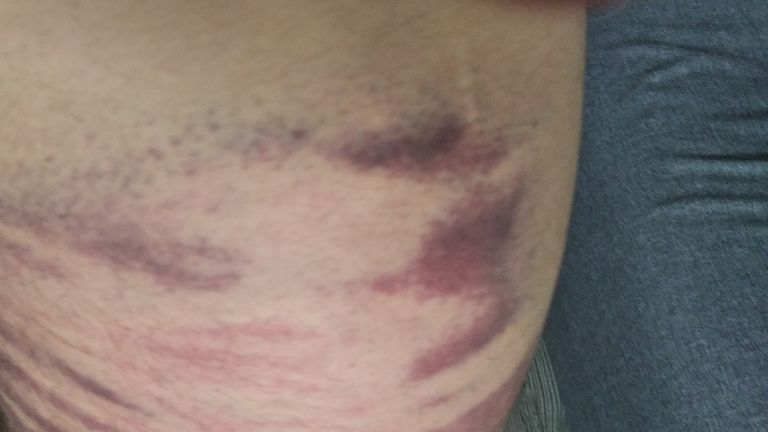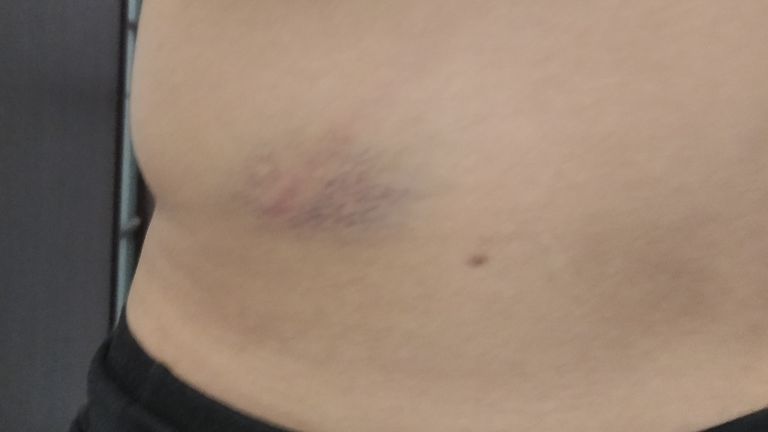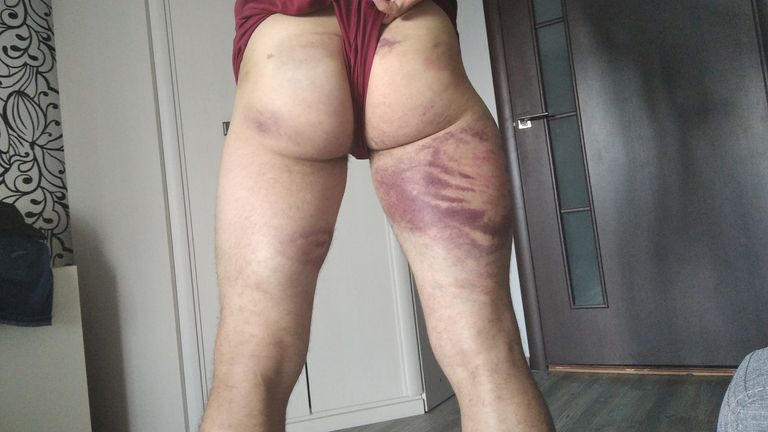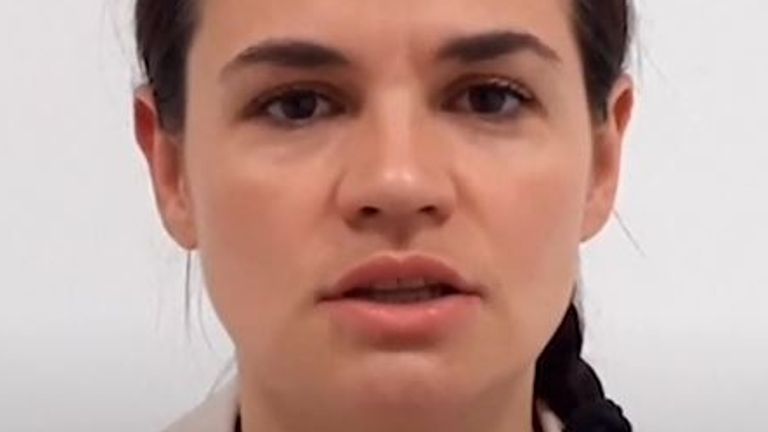The young man smiled as he recalled three days of brutal beatings by riot police in Belarus detention after protesters rejected the re-election of longstanding leader Alexander Lukashenko.
He said it is his way of coping with the terror and injustice. So, too, is speaking out.
Igor Kviatko, 23, told Sky News he was hauled out of a taxi, hit with batons and tear gassed by police – despite saying he had nothing to do with the wave of anti-government protests.
He lifted up his shorts to reveal significant bruising to his thighs and backside from what he described as punishment beatings.
The railway worker – a locksmith – winced in pain as he sat back down, unable to find a comfortable position to tell his story.
He asked: “Why grab and beat me?”
“What then is our country – democratic or we have a dictatorship? What is it? What is it?
“Or do we have a concentration camp? Just a concentration camp.”
Close to 7,000 people have been arrested since a disputed presidential election last Sunday triggered an unprecedented outpouring of protests across Belarus – and a violent crackdown by the police and security services.
In a rare climbdown, the government on Friday apologised for the use of force as it freed more than 2,000 of the people who had been detained.
The UK and European Union have condemned the police brutality and called for the immediate release of all detainees.
For Mr Kviatko, his ordeal began when he caught a taxi with two friends after finishing work for the day last Monday. He planned to go to one of their houses.
Police were combatting protests in the streets, beating and arresting demonstrators.
As the taxi sat in traffic, Mr Kviatko said riot police suddenly appeared. One knocked on the window and ordered them out of the car.
“We opened the door, they simply pulled us out, beat us on our legs with a rubber stick, face down on the ground,” he said.
“They hit our feet and asked: ‘Where are you from?’ I replied: ‘I am driving from work’ but they hit even harder, it was very painful.”
He said he was bundled into a van where the beating continued over a number of hours.
At one point, Mr Kviatko said the security forces put on gas masks and let off a gas canister inside the vehicle.
He said: “When gas was sprayed, it was very difficult to breathe and your eyes hurt a lot, you cannot open them as when you open them the gas gets on the surface of your eyes and you want to close them.
“So you close like this and sit.
“This is the punishment. This is how they do it.”
He and dozens of other detainees were driven to a detention centre where Mr Kviatko said they were told to run past a line of masked security personnel who beat them again.
They were ordered to kneel on the ground for several hours before an official came to register their names and they were moved to a holding room where he had to face a wall, hands behind his head.
By this time, it was the early hours of the morning.
The young man said the masked troops were replaced by ordinary policemen who were less aggressive, offering the detainees water and letting them go to the toilet.
But, he said later on Tuesday when the more military-looking personnel returned, the beating began again, with officers asking him why he wanted change in the country even though he had repeatedly denied taking part in the protests – these denials triggered more beatings.
At some point he and others were moved in a police van to a second detention centre, with a similar ritual upon arrival.
“A column of riot police was lined up and again we had to run through the line to the cells, hands behind our backs,” he said.
“One riot policeman held a stick at the level of his abdomen and said: ‘Keep your head lower – if you get up, you get hit on the head’.”
Mr Kviatko was crammed into a cell with about 120 other people. There were four other similarly sized cells, with around 500 detainees in total.
He described hearing the screams and cries for help of other detainees as they were beaten.
By this point – almost two days after his arrest – he and his fellow inmates were given a small amount of food to share. A system was in place to process them.
The young man said people who admitted to whatever they were charged with were being given 10 days in prison while those who denied the charge were jailed for 15 days.
Despite being innocent, he said he just wanted to be prosecuted rather than continue to wait in frightened limbo.
At midday on Wednesday, a list emerged of detainees who would simply be freed.
His name was on the list but he had to wait until 5am the following morning before it was his turn to be processed.
“We were taken out into the street, there were tables and riot police in masks,” he said.
One of the officers asked him if he planned to go out at the weekend and what he would do?
“We were placed against the wall, hands behind our back. When they call your name, you go out of line, there is paper on the table, if you read it or ask any questions, about what is it – you will be beaten.
“If you don’t sign the paper – in front of me a man who was brought behind the fence and beaten, we heard screams. He was brought back, he signed what was necessary.”
Seeing all of this, Mr Kviatko decided he would just sign without even reading what was on the document.
“Everyone who signed was taken to another part of this territory. One of the OMON [riot police] officers gave the order to run through the sand without touching the grass,” he said.
“You had to run. Nearby there is a blue bus, from there the riot policemen give the command to ‘lie face down on the ground’.
“They came up and beat us with rubber batons for one, to one-and-a-half minutes as a farewell.
“You lie on the ground, nothing can be done. The pain is so strong that the men just cried, someone lost his voice, we begged them to stop.
“But not all of officials with batons appeared comfortable with what they were doing.
“One of the riot policemen said to me: ‘I am sorry, I am sorry.”
Mr Kviatko was finally allowed to leave, though his possessions, including money, his phone and a chain, were not returned to him. His two friends are also still in detention.
Speaking from his home on Friday, Mr Kviatko said he has spoken to a human rights lawyer about what happened and is officially documenting his case with the authorities.
“I need to record evidence of beatings, so it can be proved that I was simply arrested on the street,” he added.

